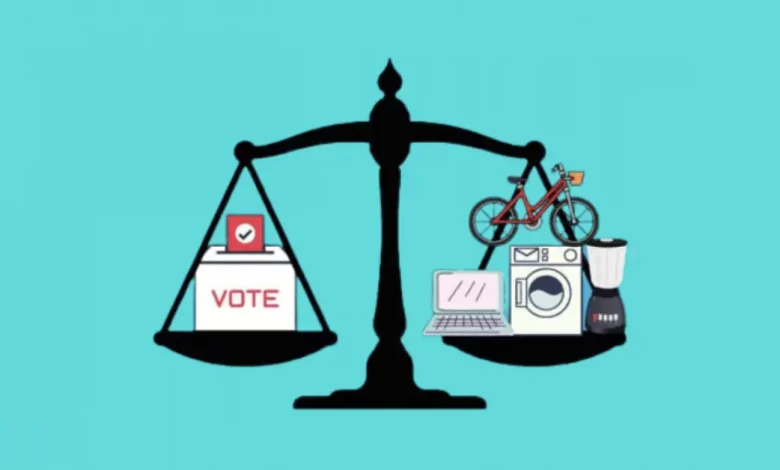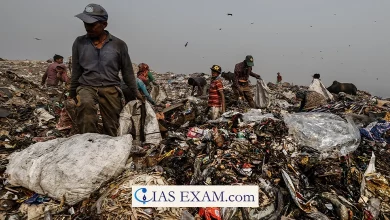Daily Current Affairs for UPSC
Freebies in Elections
Syllabus- Government Policies and Interventions [GS Paper-2]

Context- Vice President Jagdeep Dhankhar recently said that the politics of freebies distort expenditure priorities, noting the need to “empower not pockets but human minds.”
About
- “Freebies” are goods or services provided by the government to citizens without any charge.
- They encompass a wide range of programs and benefits, from food subsidies and healthcare to education and transportation.
Types of Freebies:
- Subsidies: like food, fuel, and electricity.
- Direct transfers: This involves providing cash or vouchers directly to beneficiaries.
- Public services: This encompasses free education, healthcare, and other public services.
- Tax breaks: This includes exemptions or reductions in taxes for certain individuals or groups.
Current status in India
- The political class has engineered a constituency of ‘beneficiaries’ to power electoral viability. The polls are reduced to a contest of competing promises of freebies and cash transfers.
- The old approach of wooing voters across segments has given way to targeted promises. For instance, women and farmers are emerged as major targets of this freebies culture:
- Women: States are racing to up the ante with promises for the affection of women voters.
- In Madhya Pradesh, cash transfers under the Ladli Behna scheme increased from Rs 1,000 to Rs 1,500 before the recent assembly elections.
- In Rajasthan, the previous government promised Rs 10,000 per year to women and in Telangana K Chandrasekhar Rao government promised Rs 3,000 per month to women.
- Farmers: More than 45 percent of India’s working population is engaged in agriculture and also constitutes an important constituency.
- In 2018, Telangana and Odisha came up with a scheme to supplement the income of farmers under Rythu Bandhu and KALIA schemes.
- The idea was adopted nationally as Kisan Samman Nidhi by the Prime Minister.
- Women: States are racing to up the ante with promises for the affection of women voters.
Arguments in favour of freebies
- Reducing poverty and inequality: Free payments can provide important support to vulnerable populations, helping them meet their basic needs and reducing poverty and inequality.
- Ensuring social justice: Free education and health care can empower individuals and create opportunities for upward mobility in society.
- Stimulate economic growth: Freebies can boost economic activity by increasing consumer spending and demand.
- Fulfill welfare obligations: Providing basic needs of the citizens is considered as a prime welfare responsibility of the government.
Arguments Against Freebies
- Financial burden: Freebies can be a significant strain on government finances, leading to fiscal deficits and debt accumulation.
- Misuse and leakages: Improper targeting and inefficient implementation can lead to leakages and misuse of funds, diverting resources away from intended beneficiaries.
- Paracetamol effect: The need for cash transfers and freebies is essentially the price of unattended issues. There is an audible silence on political issues such as agriculture, education and health.
- Moral hazard: Critics say freebies can create a culture of dependency and discourage people from working.
- Economic distortions: Price subsidies and other freebies can distort economic incentives and lead to inefficiencies.
- Waste costs: Free smartphones and TVs are distributed at a time when their penetration is already very high even in remote villages.
What is needed?
- Elections promise to build human capital, such as high-quality educational content in the local language, or the creation of computer classes for slum children, or investments in health care.
- Girls and women are good investment opportunities. For example, Girls’ Free Bikes remove excuses for families to continue girls’ education, or girls’ education vouchers paid directly to the educational institution are better options.
Conclusion
- Globally, India ranks first in terms of population and number of internet users. However, India’s low place in the world human capital index (116th/174th) is worrying. Therefore, our goalposts must now be moved and turned inward, so that our human capital as a central focus of our politics is strengthened, even in electoral promises.
Source: The Hindu
Practice question:
Q. Write a short note on the ongoing debate of Freebies culture in India





.png)



